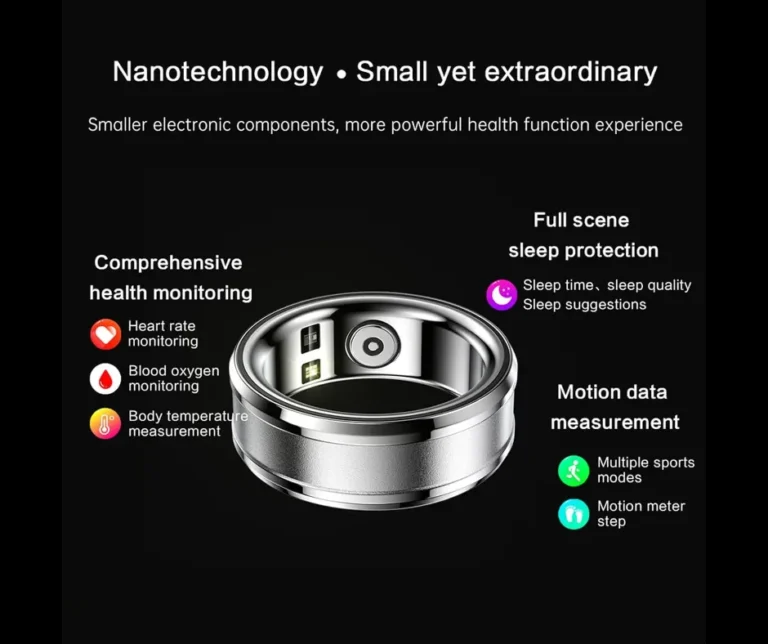Sleep Body Temp Monitoring Improve Your Health
If you often wake up feeling groggy and fatigued, or struggle to fall and stay asleep, you are not alone.
In today’s fast-paced world, getting a good night’s sleep has become increasingly difficult.
However, the quality and duration of our sleep have a significant impact on our overall health and well-being.
That’s where sleep body temperature monitoring comes in.
By tracking your body temperature while you sleep, you can gain valuable insights into your sleep patterns and make necessary adjustments to improve your overall health.
This innovative technology has been gaining popularity in recent years and is now being used by many health-conscious individuals.
In this article, you will learn about the importance of Sleep Body Temp Monitoring Improve Your Health and help you achieve better sleep quality and, in turn, improve your overall health.
So, grab a cup of tea and get ready to discover how this simple yet effective method can transform your sleeping habits for the better.
Table of Contents Sleep Body Temp Monitoring Improve Your Health
Monitor your sleep body temperature
To optimize your overall health, it is crucial to pay attention to the various factors that can impact your sleep quality.
One such factor that often goes unnoticed is the monitoring of your sleep body temperature.
By tracking your body temperature throughout the night, you gain valuable insights into your sleep patterns and can make necessary adjustments to improve your sleep quality.
Research has shown that maintaining a stable and slightly cool body temperature during sleep can lead to more restorative sleep and better overall health.
When your body temperature drops naturally during the night, it promotes deep sleep and allows your body to recover and rejuvenate.
On the other hand, if your body temperature remains too high or fluctuates significantly during sleep, it can disrupt your sleep cycles and leave you feeling tired and groggy in the morning.
By monitoring your sleep body temperature, you can identify any irregularities and take proactive measures to create an optimal sleep environment, such as adjusting the thermostat, using breathable bedding materials, or practicing relaxation techniques to promote a cool and comfortable sleep environment.
With regular monitoring and adjustments, you can improve your overall health by ensuring a restful and rejuvenating night’s sleep.
Track patterns for better health
To achieve better overall health, it is essential to track patterns and make informed decisions based on the data collected.
By monitoring various aspects of your daily routine such as sleep patterns, exercise, and nutrition, you can gain valuable insights into your habits and make necessary adjustments for improvement.
Tracking patterns for better health allows you to identify potential areas of concern, such as irregular sleep patterns or unhealthy eating habits, and take proactive measures to address them.
Additionally, it provides you with a clear understanding of how certain behaviors or habits may be impacting your overall well-being.
Whether it’s monitoring your sleep body temperature, tracking your daily step count, or recording your calorie intake, the ability to track patterns empowers you to make informed choices that can positively impact your overall health and well-being.
Adjust room temperature accordingly
To optimize your sleep and improve your overall health, it is crucial to adjust the room temperature accordingly.
Research has shown that maintaining a cool and comfortable sleep environment promotes better quality sleep and enhances the body’s natural ability to rest and rejuvenate.
When the room temperature is too hot or too cold, it can disrupt your sleep patterns and lead to restless nights.
By ensuring that the room is at an optimal temperature, typically between 60 to 67 degrees Fahrenheit (15 to 19 degrees Celsius), you can create an environment that supports deep, uninterrupted sleep.
Adjusting the room temperature according to your comfort preferences can help regulate your body’s internal temperature and promote a more restful and rejuvenating sleep experience.
Improve sleep quality and recovery
When it comes to improving your sleep quality and facilitating better recovery, implementing sleep body temperature monitoring can be highly beneficial.
By tracking your body temperature throughout the night, you can gain valuable insights into your sleep patterns and make necessary adjustments to optimize your rest.
Sleep body temperature monitoring allows you to identify any fluctuations or irregularities in your body’s temperature during different sleep stages, such as REM and deep sleep.
This information can help you understand the quality of your sleep and identify potential issues, such as night sweats or temperature fluctuations that may be disrupting your rest.
By addressing these issues and maintaining a consistent and comfortable body temperature throughout the night, you can enhance your overall sleep quality, promote better recovery, and wake up feeling more refreshed and energized.
Enhance overall well-being with monitoring
Monitoring your body temperature goes beyond improving your sleep quality; it can also enhance your overall well-being.
By tracking changes in your body temperature throughout the day, you can gain insights into your circadian rhythm and identify patterns that may affect your energy levels and mood.
For example, noticing a drop in body temperature during certain times of the day may indicate periods of low energy and productivity.
By being aware of these patterns, you can plan your activities accordingly, optimizing your performance during peak times and incorporating breaks or relaxation during periods of lower body temperature.
Additionally, monitoring your body temperature can help you identify any potential health issues or imbalances.
Fluctuations in body temperature may be a sign of underlying conditions that need attention.
By detecting these early on, you can take proactive steps to address them, promoting better overall health and well-being.
Whether it’s optimizing your sleep or understanding your body’s natural rhythms, incorporating temperature monitoring into your daily routine can have a profound impact on your overall health and quality of life.
Overall, incorporating sleep body temperature monitoring into your nightly routine can greatly improve your overall health.
By ensuring that your body is at the optimal temperature for restful sleep, you can experience better sleep quality, improved physical and mental recovery, and even boost your immune system.
Consider investing in a sleep tracking device or simply monitoring your bedroom’s temperature to see the positive impact it can have on your well-being.
Remember, good sleep is essential for a healthy and happy life.
So why not take the necessary steps to make sure you’re getting the best rest possible? Your body will thank you.
FAQ
How does monitoring your body temperature during sleep help improve overall health?
Monitoring your body temperature during sleep helps improve overall health by ensuring that your body is in an optimal state for rest and recovery.
By tracking your temperature, you can identify patterns of overheating or cooling that may disrupt your sleep cycle.
Maintaining a stable body temperature throughout the night can lead to better quality sleep, improved immune function, and overall well-being.
Being aware of your body temperature can also help you identify potential health issues early on, allowing for timely intervention and prevention of more serious conditions.
What are the potential benefits of tracking body temperature while sleeping?
Tracking your body temperature while sleeping can help identify patterns of overheating or cooling that may affect the quality of your sleep.
By monitoring fluctuations in temperature, you can adjust your bedding or room temperature to create a more comfortable sleep environment.
Additionally, tracking your body temperature can provide insights into your overall health, as changes in temperature during sleep may indicate underlying health issues or hormonal imbalances.
Overall, monitoring your body temperature while sleeping can help you optimize your sleep quality and potentially improve your overall well-being.
How can changes in body temperature during sleep indicate underlying health issues?
Changes in body temperature during sleep can indicate underlying health issues by revealing disruptions in the body’s natural temperature regulation, which may be linked to conditions such as hormonal imbalances, infections, or metabolic disorders.
Monitoring fluctuations in body temperature can provide valuable insight into your overall health and help identify potential issues that may require further medical evaluation or intervention.
It is important to pay attention to these changes and consult with a healthcare provider if you notice persistent or significant variations in your body temperature during sleep.
What are some ways to monitor body temperature while sleeping?
To monitor your body temperature while sleeping, you can use a thermometer, a smart wearable device, or a smart mattress that tracks your temperature.
These tools can provide accurate readings and help you understand your body’s temperature fluctuations during sleep.
By tracking your body temperature, you can ensure a comfortable sleep environment and address any issues that may be affecting your sleep quality.
How can adjusting room temperature and bedding help optimize sleep and improve overall health?
Adjusting the room temperature and bedding can help optimize your sleep and improve your overall health by creating a comfortable sleep environment.
Keeping the room cool and using breathable bedding can regulate your body temperature, promoting better sleep quality.
This can also reduce the risk of overheating or feeling too cold during the night, which can disrupt your sleep cycle.
By prioritizing a comfortable sleeping environment, you can enhance your sleep quality, boost your immune system, and support overall well-being.
Remember to adjust these factors to suit your personal preferences and create the ideal conditions for restful sleep.







